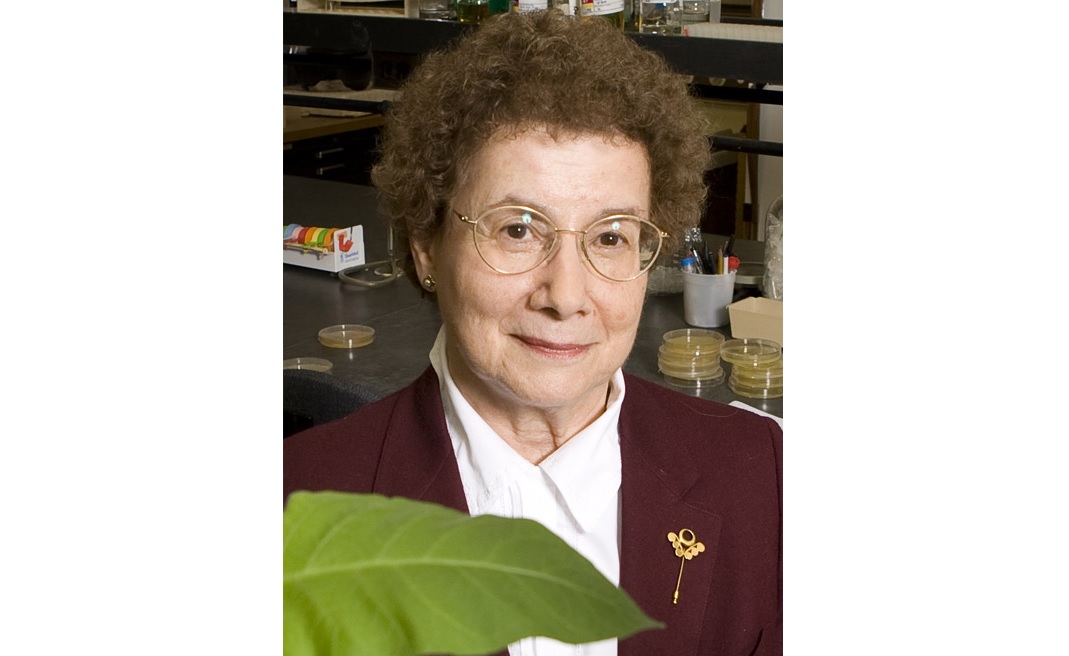
Anne K. Vidaver received her B.A. degree in biology at Russell Sage College, Troy, NY, and her M.S. and Ph.D. degrees in bacteriology at Indiana University, Bloomington. She joined the Department of Plant Pathology at the University of Nebraska in 1966 and progressed from a position as a research associate to that of professor and head of the department within 18 years, a position she has held for the past 14 years. Dr. Vidaver’s initial contributions to plant pathology came through the excellence of her research program. She is one of a small group of individuals who are responsible for developing the foundations of modern plant bacteriology. Any description of Dr. Vidaver’s research accomplishments must mention her fundamental studies of bacteriocins and the phi 6 bacteriophage. The phi 6 bacteriophage, which she discovered, formed the basis of a new family of viruses, and it was the first double-stranded RNA virus discovered in bacteria. This virus has since attracted much interest as a model dsRNA virus system. Her research with gram-positive plant-pathogenic bacteria forms the foundation of much of the current research with these important, but intransigent, plant pathogens. Her pioneering studies in many areas of plant bacteriology have led to extensive work of great importance and have promoted the development of plant bacteriology as a rich area for scientific study. Typical of many of our pioneering leaders in plant pathology, Dr. Vidaver has received awards not only for her contributions to fundamental research, but also for her applications of knowledge to the solution of immediate plant disease problems.
Dr. Vidaver has been an instructor of graduate students, both through a formal course on plant-pathogenic bacteria and through advising graduate student research. Her impact on students and colleagues has been significant; she is recognized as one of the foremost mentors in plant pathology. Many former associates and friends continue to seek her advice and counsel as they progress through their careers in plant pathology.
Dr. Vidaver, as department head, sets a high standard of research excellence in her department, and there is high morale among her faculty members. Her leadership as an administrator has recently led to an additional assignment, as the interim director of the University of Nebraska’s Center for Biotechnology. In this position, she is responsible for programs that occupy a considerable portion of a new George W. Beadle Center for Genetics and Biomaterials Research.
Dr. Vidaver has served APS in various capacities including secretary and as the second woman in APS history to be elected its president. Dr. Vidaver had a significant impact on APS’s decision to turn its attention from centering on internal issues into developing a systematic program of informing the public about issues of interest to plant pathology. She was instrumental in the development of the APS Office of Public Affairs and Education and served as its first director. She has been actively involved with the APS Foundation, having served on its Board of Directors and as treasurer. Such intense involvement in the activities of APS would normally leave most individuals with little time for other activities, particularly if they are a department head who maintains an active research and teaching program. This level of activity apparently has not taxed Dr. Vidaver, since she has also been actively involved in the leadership of the American Society for Microbiology. She has served the H. A. Wallace Institute for Alternative Agriculture on its Board of Directors, as treasurer, and recently as president. She has clearly developed an outstanding legacy of leadership in science, both in its practice and in roles that influence the direction of science policy.
As important as her impact in teaching, research, and administrative leadership are, Dr. Vidaver’s recent contributions to plant pathology as a spokesperson and policymaker are touching all members of APS. She has represented APS and the American Society for Microbiology before congressional committees; has been a member of important government policy boards including the National Agricultural Research, Extension, Education, and Economics Advisory Committee and the National Academy of Sciences Board on Agriculture; and has been an important source of credible information for key government policymakers. Her position as chair of the APS National Plant Pathology Board, a post she has held from the time of this board’s organization, has allowed APS to benefit from the visibility that comes from her outstanding contributions to science and our citizens. In summary, Dr. Vidaver has made outstanding contributions in both research and teaching, has served as an effective administrator at her university, and has conducted her professional service activities with dedication and compassion. She more than meets the very high standards that have been set for recipients of the APS Award of Distinction.